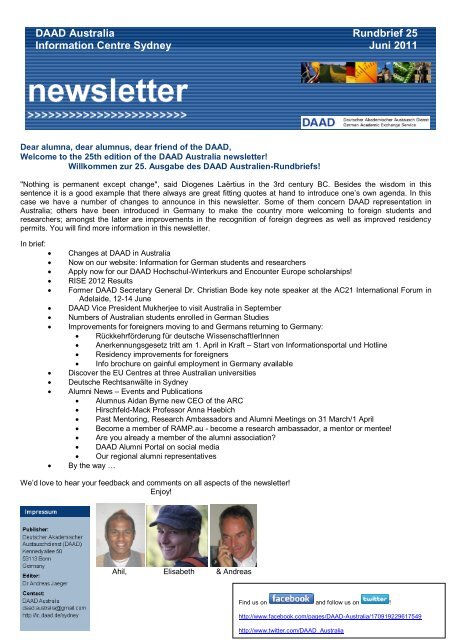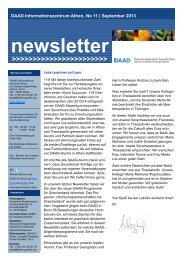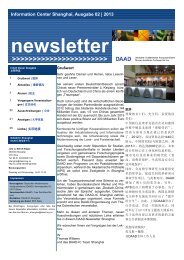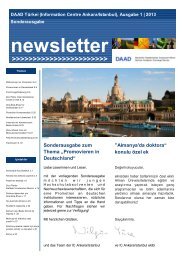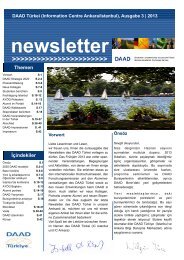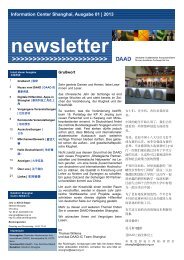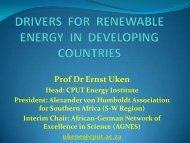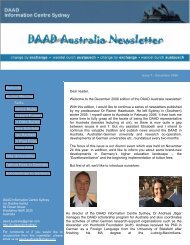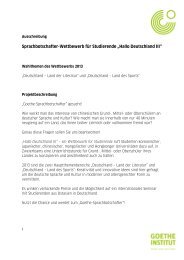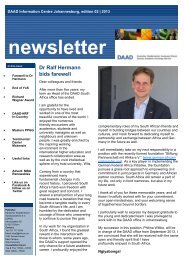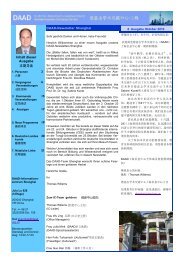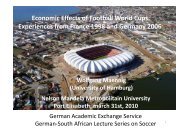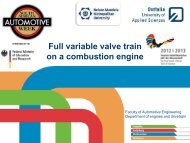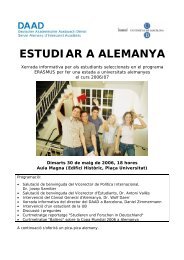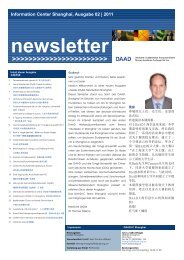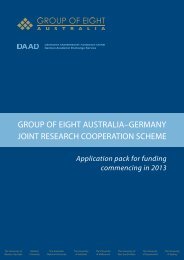Issue 25, June 2012 - DAAD
Issue 25, June 2012 - DAAD
Issue 25, June 2012 - DAAD
You also want an ePaper? Increase the reach of your titles
YUMPU automatically turns print PDFs into web optimized ePapers that Google loves.
<strong>DAAD</strong> Australia<br />
Information Centre Sydney<br />
Dear alumna, dear alumnus, dear friend of the <strong>DAAD</strong>,<br />
Welcome to the <strong>25</strong>th edition of the <strong>DAAD</strong> Australia newsletter!<br />
Willkommen zur <strong>25</strong>. Ausgabe des <strong>DAAD</strong> Australien-Rundbriefs!<br />
Rundbrief <strong>25</strong><br />
Juni 2011<br />
"Nothing is permanent except change", said Diogenes Laërtius in the 3rd century BC. Besides the wisdom in this<br />
sentence it is a good example that there always are great fitting quotes at hand to introduce one’s own agenda. In this<br />
case we have a number of changes to announce in this newsletter. Some of them concern <strong>DAAD</strong> representation in<br />
Australia; others have been introduced in Germany to make the country more welcoming to foreign students and<br />
researchers; amongst the latter are improvements in the recognition of foreign degrees as well as improved residency<br />
permits. You will find more information in this newsletter.<br />
In brief:<br />
� Changes at <strong>DAAD</strong> in Australia<br />
� Now on our website: Information for German students and researchers<br />
� Apply now for our <strong>DAAD</strong> Hochschul-Winterkurs and Encounter Europe scholarships!<br />
� RISE <strong>2012</strong> Results<br />
� Former <strong>DAAD</strong> Secretary General Dr. Christian Bode key note speaker at the AC21 International Forum in<br />
Adelaide, 12-14 <strong>June</strong><br />
� <strong>DAAD</strong> Vice President Mukherjee to visit Australia in September<br />
� Numbers of Australian students enrolled in German Studies<br />
� Improvements for foreigners moving to and Germans returning to Germany:<br />
� Rückkehrförderung für deutsche WissenschaftlerInnen<br />
� Anerkennungsgesetz tritt am 1. April in Kraft – Start von Informationsportal und Hotline<br />
� Residency improvements for foreigners<br />
� Info brochure on gainful employment in Germany available<br />
� Discover the EU Centres at three Australian universities<br />
� Deutsche Rechtsanwälte in Sydney<br />
� Alumni News – Events and Publications<br />
� Alumnus Aidan Byrne new CEO of the ARC<br />
� Hirschfeld-Mack Professor Anna Haebich<br />
� Past Mentoring, Research Ambassadors and Alumni Meetings on 31 March/1 April<br />
� Become a member of RAMP.au - become a research ambassador, a mentor or mentee!<br />
� Are you already a member of the alumni association?<br />
� <strong>DAAD</strong> Alumni Portal on social media<br />
� Our regional alumni representatives<br />
� By the way …<br />
We’d love to hear your feedback and comments on all aspects of the newsletter!<br />
Enjoy!<br />
Ahil, Elisabeth & Andreas<br />
Find us on<br />
Find us on and follow us on !<br />
http://www.facebook.com/pages/<strong>DAAD</strong>-Australia/170919229617549<br />
http://www.twitter.com/<strong>DAAD</strong>_Australia
<strong>DAAD</strong> Australien-Rundbrief - 2 -<br />
<strong>DAAD</strong> Information Centre Sydney, May 2011<br />
Changes at <strong>DAAD</strong> Sydney<br />
My dear friends, colleagues, partners – after 6 ½ years,<br />
the end of my contract and of my time in Australia is<br />
close. I will be leaving my two positions as director of the<br />
<strong>DAAD</strong> Information Centre Sydney and as lecturer at the<br />
German Department of the University of Sydney at the<br />
end of <strong>June</strong>. While this is sad news, I also believe that<br />
every change generates fresh ideas and new<br />
approaches, and I am very confident that I'll be leaving<br />
you in the very best hands: Jörn Hausner will be my<br />
successor from July onwards. Please find below a brief<br />
greeting that he kindly sent us for our newsletter. In the<br />
meantime, I would like to thank you all for the wonderful<br />
and enriching experience of working with you. I already<br />
know that I will miss all of you, my jobs, and our life in<br />
Australia. At the same time, I am looking forward to new<br />
challenges for me and my whole family at the Schloss<br />
Schule Salem, close to Lake Constance in Southern<br />
Germany.<br />
I also would like to thank you for the support with which I<br />
am sure you will welcome Joern and make his first<br />
weeks and months easier.<br />
G’Day/ Liebe LeserInnen,<br />
gern nehme ich die Einladung von<br />
Herrn Dr. Andreas Jäger an, mich<br />
in dem letzten von ihm<br />
herausgegebenen Newsletter als<br />
sein Nachfolger vorzustellen. In gut<br />
sechs Wochen schon beginnt für<br />
mich das Abenteuer Australien und<br />
damit vor allem die<br />
Herausforderung, seine<br />
erfolgreiche Arbeit im besten Sinne<br />
fortzusetzen und auch weiter zu führen. Wie viel<br />
dazugehört, in Andreas’ Fußstapfen zu treten, können<br />
die LeserInnen dieses Newsletter anhand der<br />
Bandbreite der regelmäßig verhandelten Themen u.U.<br />
noch besser ermessen als ich im Moment.<br />
Zu meiner Person: Ich habe in Leipzig am Herder-Institut<br />
DaF studiert und war fünf Jahre in Chambéry als <strong>DAAD</strong>-<br />
Lektor tätig. Nach meiner Rückkehr nach Berlin habe ich<br />
in einem Austauschprogramm der FU-Berlin als DaF-<br />
Koordinator gearbeitet und mich in Neukölln im Rahmen<br />
von sozialpädagogischer Jugendarbeit engagiert.<br />
Ich freue mich auf die Zusammenarbeit mit meinen<br />
KollegInnen der University of Sydney, mit der Crew des<br />
IC-Büros, mit meinen <strong>DAAD</strong>-KollegInnen in Adelaide<br />
und Melbourne sowie allen anderen Multiplikatoren und<br />
Mittlern.<br />
Sonnige Grüße in alle Richtungen aus einem<br />
überraschend hochsommerlichen Berlin und auf sehr<br />
bald,<br />
Ihr Jörn Hausner<br />
G’Day/ Dear readers,<br />
I'm happy to accept Andreas' invitation to introduce<br />
myself in this newsletter. In about six weeks, my<br />
adventure in Australia and the challenge of continuing<br />
Andreas' successful work will begin. Considering the<br />
large spectrum of topics and issues that are regularly<br />
featured in this newsletter, you will probably have an<br />
even better idea of what this entails than I currently do.<br />
But let me introduce myself: I studied DaF (Deutsch als<br />
Fremdsprache, German as a Foreign Language) in<br />
Leipzig and then spent five years in Chambéry as <strong>DAAD</strong><br />
lecturer. After my return to Berlin, I served as DaF<br />
coordinator for an FU Berlin exchange programme and<br />
was also involved in youth social work.<br />
I look forward to working with my colleagues at the<br />
University of Sydney, the IC team in Sydney and my<br />
<strong>DAAD</strong> colleagues in Adelaide and Melbourne as well as<br />
all the other advocates, alumni and more.<br />
With best regards from the surprisingly warm and<br />
summery city of Berlin,<br />
Jörn Hausner<br />
Thanks, Jörn, I wish you all the best down under!<br />
You might have read with surprise that Joern addressed<br />
a <strong>DAAD</strong> colleague in Adelaide – this is very exciting<br />
news indeed! In addition to Melbourne University, where<br />
our lovely and energetic Tina Stubenrauch works as<br />
<strong>DAAD</strong> lecturer, and Sydney University, the German<br />
Department at the University of Adelaide will get a <strong>DAAD</strong><br />
lecturer, Stefan Hajduk, who will introduce himself in our<br />
next newsletter. Meanwhile, we have some biographical<br />
information for you:<br />
Dr Stefan Hajduk studied German Studies, Philosophy<br />
and Theatre Studies in Frankfurt, Munich, Rome, Naples<br />
and Baltimore. After gaining his PhD at Humboldt<br />
University, Berlin, in 1998, Stefan worked as a lecturer at<br />
the University of Poona (India) and the University of<br />
Limerick (Ireland). His main focus is on German<br />
literature from the 18th to the 21st century; apart from<br />
pulications on Goethe, E.T.A. Hoffmann, Fontane and<br />
others, Stefan has also published a book on Robert<br />
Musil (Die Figur des Erhabenen. Robert Musils<br />
ästhetische Transgression der Moderne; Würzburg<br />
2000). His current research deals with the aesthetics<br />
and poetics of Stimmung ("mood" or "atmosphere") since<br />
Goethe's times.<br />
Stefan, all the best from us all!<br />
Andreas and the <strong>DAAD</strong> team Australia<br />
back
<strong>DAAD</strong> Australien-Rundbrief - 3 -<br />
<strong>DAAD</strong> Information Centre Sydney, May 2011<br />
Now on our website: Information for German<br />
students and researchers<br />
As this is something we've been frequently asked in the<br />
past, we have now put together some information for<br />
Germans wanting to study or do research in Australia as<br />
well as information for German researchers wanting to<br />
return to Germany permanently. You will find all this and<br />
more on our website:<br />
http://ic.daad.de/sydney/StipendienfuerDeutsche.htm<br />
Apply now for our <strong>DAAD</strong> Hochschul-Winterkurs<br />
and Encounter Europe scholarships!<br />
Winterkurs<br />
In co-operation with the universities of Duisburg-Essen,<br />
Freiburg, Leipzig and the IIK Duesseldorf, the <strong>DAAD</strong> is<br />
once again offering scholarships to participate in a sixweek<br />
"Deutschlandkundlicher Winterkurs in January and<br />
February 2013. The programme is designed for<br />
bachelor, master and PhD students with a sound<br />
knowledge of German (at least B1, preferably B2) and<br />
some background in German Studies who are interested<br />
in improving their language skills and understanding of<br />
contemporary affairs and aiming for further (p/g) studies<br />
in Germany.<br />
The programme includes a course of six weeks (German<br />
language, German literature and Modern Cultural<br />
Studies of Germany) including study trips.<br />
For more information and an application pack, please<br />
visit http://ic.daad.de/sydney/winterkurs.htm.<br />
Encounter Europe<br />
In co-operation with<br />
the ASKO Europa Stiftung (AES) and other renowned<br />
partners in Germany and Australia, the <strong>DAAD</strong> is once<br />
again offering scholarships for a two-week course<br />
dealing with a variety of issues regarding the European<br />
Union. Two weeks full of exciting opportunities for<br />
students – from the fields of law, politics, international<br />
relations, European studies or similar subjects – wanting<br />
to improve their understanding of contemporary<br />
European affairs and legislative regulations, organised<br />
by the European Academy Otzenhausen, the University<br />
of New England and the <strong>DAAD</strong>.<br />
The course will be held in English. The programme<br />
consists of a course on European affairs as well as study<br />
trips to Trier, Luxembourg (European Court of Justice,<br />
city), Strasbourg (European Parliament, European Court<br />
of Human Rights, city with Christmas market), and<br />
Germany’s former capital, Bonn (visiting the <strong>DAAD</strong>). For<br />
more information, please visit<br />
http://ic.daad.de/sydney/encounter%20europe.htm<br />
back<br />
RISE <strong>2012</strong> – Results<br />
In addition to the first round, the second round of the<br />
new <strong>DAAD</strong> RISE research internship programme has<br />
been a resounding success: 241 German bachelor<br />
students (2011: 247) were selected for internship<br />
positions in 28 countries across the world (2011: 22).<br />
Even though numbers were slightly lower than for the<br />
first round, with a total of 557 internship offers (2011:<br />
643) for which 373 applications were received (2011:<br />
408). Australia ranked 3rd after the USA and Canada,<br />
with 150 applications received for 86 offers. In the end,<br />
43 students were successful in gaining a scholarship for<br />
Australia.<br />
Most of the students, of which 120 were female and 121<br />
male, are studying biology or physics, with engineering,<br />
earth sciences and chemistry featuring as well.<br />
The next RISE round will start later this years, and offers<br />
can be placed online from October 8 to November <strong>25</strong>.<br />
More information will be available from July or August<br />
onwards.<br />
Former <strong>DAAD</strong> Secretary General Dr. Christian<br />
Bode key note speaker at the AC21<br />
International Forum in Adelaide<br />
Recently retired but<br />
still more than active<br />
<strong>DAAD</strong> Secretary<br />
General Dr. Christian<br />
Bode, who was our<br />
guest down under at<br />
the Australia-wide <strong>DAAD</strong> Alumni Conference at Sydney<br />
University in 2010, will follow the invitations of University<br />
of Adelaide's Vice-Chancellor and President, Professor<br />
James McWha, and of also recently retired Pro Vice-<br />
Chancellor (International) Professor John Taplin to be a<br />
keynote speaker at the AC21 International Forum. The<br />
title of his talk will be "(Higher)Education in times of<br />
Globalisation - the universities' responsability". You’ll<br />
find an abstract on our <strong>DAAD</strong> Sydney website.<br />
Academic Consortium 21 is a consortium of 20<br />
universities, including Freiburg, Strasbourg, Nagoya,<br />
Peking, SJTU, Chulalongkorn, Adelaide, Sydney. Every<br />
two years there is an AC21 International Forum. This<br />
year, it is being held from 12-14 <strong>June</strong>, hosted by the<br />
University of Adelaide (see<br />
http://www.adelaide.edu.au/ac21conference/). The<br />
theme of this year's conference is "Maximising the<br />
Benefits of Internationalisation". A spokesperson for the<br />
university is anticipating an attendance of about 100-200<br />
people.<br />
When inviting Dr. Bode, Prof. Taplin was so thoughtful to<br />
add that he trusts Christian Bode should be able to see
<strong>DAAD</strong> Australien-Rundbrief - 4 -<br />
<strong>DAAD</strong> Information Centre Sydney, May 2011<br />
the Holland/Germany match on TV on 13 <strong>June</strong> over here<br />
- an always important match rekindling decades of<br />
intense soccer rivalry.<br />
Dr Bode will also meet <strong>DAAD</strong> alumni and <strong>DAAD</strong>-AAvHF<br />
research ambassadors I Adelaide.<br />
<strong>DAAD</strong> Vice President Mukherjee to visit<br />
Australia in September<br />
The Group of Eight universities together with the<br />
German Embassy and the ANU Centre for European<br />
Studies are organising a talk by Professor Joybrato<br />
Mukherjee, Vice-President of the <strong>DAAD</strong> and President of<br />
the University of Gießen. The talk, entitled From<br />
egalitarian to elite and back: Recent policy shifts in<br />
higher education in Germany will be held at the ANU<br />
Centre for European Studies, 1 Liversidge Street (Bldg.<br />
67C) in Canberra on Tuesday, 11 September, 12pm-<br />
1.30pm. Please RSVP to europe@anu.edu.au by Friday<br />
31 August <strong>2012</strong>.<br />
Professor Mukherjee was elected President of the<br />
Justus Liebig University (JLU) in Gießen, Germany, in<br />
December 2010. In January <strong>2012</strong> he took on the role of<br />
Vice-President of the <strong>DAAD</strong>. At 39, Professor Mukherjee<br />
is Germany’s youngest university<br />
president.<br />
Professor Mukherjee’s research<br />
interests include computer<br />
supported corpus linguistics and<br />
English syntax. He is a member<br />
of the International Graduate<br />
Centre for the Study of Culture<br />
and the Centre for Media and<br />
Interactivity and participates in a<br />
variety of international research<br />
projects and collaborations.<br />
He will discuss the significant change in the traditional<br />
egalitarian approach to funding for higher education in<br />
Germany made in 2006: The “Excellence Initiative”, a<br />
competitive process based on peer review by<br />
international experts, has resulted in a relatively small<br />
number of institutions being singled out to receive large<br />
grants. The aims of this policy include the improvement<br />
of the global attractiveness and rankings of the<br />
“excellent” universities, a sustainable structural change<br />
in universities, the creation of thousands of high quality<br />
jobs, developing the specialists, experts and executives<br />
of tomorrow and improving the contribution of<br />
universities to innovation in business and industry.<br />
At the same time there has been a significant<br />
government emphasis on increasing access to higher<br />
education for those who have been under-represented at<br />
universities in the past. According to recent OECD data,<br />
Germany still has a relatively low proportion of university<br />
graduates (29%) compared to Australia with almost<br />
40%. Is Germany aiming for an elite system or an<br />
egalitarian one and can both be achieved simultaneously<br />
with the right policies in place?<br />
The Canberra event is co-hosted by the Embassy of the<br />
Federal Republic of Germany as part of its Science<br />
Circle lecture series. The Science Circle is a joint<br />
initiative of the German embassy in Canberra and the<br />
Australian embassy in Berlin to promote mutual<br />
understanding of each country's research landscape,<br />
encourage discussion and through that provide a base<br />
for future collaboration.<br />
The Group of Eight universities have a long standing<br />
agreement with the <strong>DAAD</strong>. From 2007 to <strong>2012</strong> the two<br />
organisations have provided over A$ 5 million to<br />
research exchange between our two countries.<br />
The ANU Centre for European Studies is an initiative<br />
involving four ANU Colleges (Arts and Social Sciences,<br />
Law, Business and Economics and Asia and the Pacific).<br />
Professor Mukherjee is also invited to give his talk on<br />
shifts in the German higher education landscape at the<br />
University of Melbourne. All alumni are invited to listen<br />
to and meet him afterwards at our alumni reception, on<br />
24 September from 5-7pm. We will send out an<br />
invitation with the location. Together with our <strong>DAAD</strong> and<br />
AAvHF research ambassadors we also will organise an<br />
information talk for graduates and researchers about<br />
opportunities for research collaboration with Germany<br />
and on our mentoring program for graduates, PhD<br />
candidates and young postdocs from 3 to 4pm followed<br />
by networking with refreshments (Kaffee und Kuchen)<br />
from 4 to 5pm, in the wonderful Griffin Gallery.<br />
Please also keep an eye on our website, Facebook<br />
page, Twitter feed or our next newsletter for more<br />
details!<br />
back<br />
Numbers of Australian students enrolled in<br />
German Studies<br />
If you have been following the statistics in recent years,<br />
you might have got the impression that learning and<br />
studying German is in a continuous decline. In many<br />
countries this is true, often because the interest in<br />
German waned in the years after the fall of the Berlin<br />
wall and because German has become just one of a<br />
bigger group of competing languages.<br />
In addition, German as a language taught in secondary<br />
schools experienced a certain downturn in Australia.<br />
However, things are different at the university level! A<br />
quick survey I undertook recently indicated a total of<br />
2,923 students of German enrolled at one of 16<br />
Australian universities (1st semester <strong>2012</strong>). This means<br />
that numbers are actually pretty stable (cf. recent StaDaf<br />
resp. Netzwerk Deutsch surveys or University of<br />
Melbourne’s Dr. Leo Kretzenbacher's overview in GFL<br />
2/2011).
<strong>DAAD</strong> Australien-Rundbrief - 5 -<br />
<strong>DAAD</strong> Information Centre Sydney, May 2011<br />
All Go8 universities as well as MQU, UTAS, USQ, UTS,<br />
UNE and Newcastle University (the latter using their own<br />
tutors and UNE resources otherwise) offer German<br />
Studies or at least a German program. A similar program<br />
at JCU, however, was cancelled and is currently being<br />
phased out. There are some other universities<br />
participating at the existing German programs via cross<br />
enrolments. RMIT uses a different model, offering the<br />
first 2 stages of a beginners' language course taught by<br />
Goethe-Institut tutors.<br />
Improvements for foreigners moving to and for<br />
Germans returning to Germany<br />
There have been some recent improvements for<br />
foreigners wanting to study or work in Germany as well<br />
as for German academics interested in returning to their<br />
home country. Please see the following four articles for<br />
more information!<br />
Rückkehrförderung für deutsche<br />
WissenschaftlerInnen<br />
Seit Mitte 2009 kann der <strong>DAAD</strong> aus Mitteln des<br />
Bundesministeriums für Bildung und Forschung deutsche<br />
WissenschaftlerInnen im Ausland bei der beruflichen<br />
Wiedereingliederung in Deutschland unterstützen.<br />
Bewerbungsberechtigt sind deutsche DoktorandInnen<br />
einer ausländischen Hochschule in der Endphase ihrer<br />
Promotion (voraussichtlicher Abschluss der Promotion<br />
innerhalb der nächsten 12 Monate), PostdoktorandInnen<br />
und erfahrene WissenschaftlerInnen im Ausland, die<br />
nach einer Mobilitätsphase ihre wissenschaftliche<br />
Karriere in Deutschland fortsetzen möchten. Darüber<br />
hinaus sollen deutsche WissenschaftlerInnen, die im<br />
Ausland promoviert haben, in ihrem Bemühen<br />
unterstützt werden, Kontakte und wissenschaftliche Kooperationen<br />
mit deutschen Hochschulen einzugehen.<br />
Hierbei werden zwei voneinander unabhängige Fördermaßnahmen<br />
angeboten: Fahrtkostenzuschüsse für<br />
Vorstellungsgespräche oder Fachvorträge in Deutschland<br />
sowie bis zu sechsmonatige Stipendien.<br />
Weitere Informationen erhalten Sie unter<br />
www.daad.de/rueckgewinnung und bei Renata Dujmović<br />
(dujmovic@daad.de).<br />
Anerkennungsgesetz tritt am 1. April in Kraft –<br />
Start von Informationsportal und Hotline<br />
Friedrich Hubert Esser (Präsident des Bundesinstituts<br />
für Berufsbildung, BIBB), Bundesbildungsministerin<br />
Annette Schavan und<br />
Manfred Schmidt (Präsident des Bundesamts<br />
für Migration und Flüchtlinge, BAMF)<br />
© Bundesregierung/Steffen Kugler<br />
Viele Deutsche und<br />
nach Deutschland<br />
Zugewanderte haben<br />
im Ausland berufliche<br />
Qualifikationen<br />
und Abschlüsse erworben,<br />
die auf dem<br />
deutschen Arbeitsmarkt<br />
dringend<br />
gebraucht werden. Bisher konnten sie diese<br />
Qualifikationen in Deutschland aber oft nicht optimal<br />
verwerten, weil Bewertungsverfahren und Bewertungsmaßstäbe<br />
fehlten oder die Regelun-gen zur Anerkennung<br />
von im Ausland erworbe-nen Abschlüssen und<br />
Qualifikationen unzureichend und wenig einheitlich war.<br />
Um diese Situation zu verbessern, trat am 1. April <strong>2012</strong><br />
das so genannte Anerkennungsgesetz in Kraft. Das<br />
Gesetz schafft erstmals einen Rechtsanspruch auf ein<br />
Verfahren zur Anerkennung ausländischer Berufsqualifikationen<br />
– und zwar für alle, unabhängig vom<br />
Herkunftsland, und innerhalb von drei Monaten nach<br />
Einreichen der erforderlichen Papiere. „Durch dieses<br />
Gesetz darf beispielsweise ein hochqualifizierter Arzt<br />
aus dem Ausland endlich auch als Arzt arbeiten – und<br />
muss nicht mehr länger Taxi fahren“, sagte Bundesbildungsministerin<br />
Annette Schavan. „Für mich ist das eine<br />
Frage der Gerechtigkeit und des Respekts vor der<br />
Qualifikation eines Menschen“. Zugleich sei die<br />
Anerkennung im Ausland erworbener<br />
Berufsqualifikationen ein Baustein bei der Behebung des<br />
Fachkräftemangels.<br />
Zum neuen Gesetz gibt es ein Informationsportal und<br />
eine Telefon-Hotline. Hier kann man erfahren, welche<br />
Papiere eingereicht werden müssen und wohin man sich<br />
konkret wenden muss. Das Portal wird vom Bundesinstitut<br />
für Berufsbildung (BIBB) im Auftrag des<br />
Bundesministeriums für Bildung und Forschung (BMBF)<br />
betrieben.<br />
Ergänzend zum Anerkennungsportal schaltet das<br />
Bundesamt für Migration und Flüchtlinge (BAMF) eine<br />
Telefon-Hotline frei, die für Interessierte aus dem In- und<br />
Ausland zugänglich ist. Anrufer erhalten hier in<br />
deutscher und englischer Sprache Auskunft über die<br />
einzelnen Schritte und Voraussetzungen der beruflichen<br />
Anerkennung. Die Hotline ist montags bis freitags von 9<br />
bis 15 Uhr unter der Nummer +49 (0)30-1815-1111<br />
erreichbar.<br />
Weitere Informationen:<br />
� http://www.anerkennung-in-deutschland.de/html/en/32.php<br />
� http://www.bmbf.bund.de/de/15644.php<br />
� www.anerkennung-in-deutschland.de<br />
back<br />
Residency improvements for foreign students,<br />
graduates, scientists and researchers<br />
On 27 April <strong>2012</strong>, Germany’s federal parliament<br />
(Bundestag) passed the Act Implementing the EU<br />
Directive on Entry and Residence of Highly Qualified<br />
Workers. The scope of this law exceeds EU targets and<br />
presents foreign students, scientists and researchers<br />
with new opportunities in Germany by making a number<br />
of important changes to residency rights in Germany.<br />
For example, it will allow foreign students casual work on<br />
120 instead of previously 90 days per year; after<br />
graduation, they will be allowed to stay in Germany for<br />
18 instead of 12 months to seek qualified employment.
<strong>DAAD</strong> Australien-Rundbrief - 6 -<br />
<strong>DAAD</strong> Information Centre Sydney, May 2011<br />
They may work without time<br />
limits during this time and will<br />
no longer need to seek the<br />
approval of the German<br />
Federal Employment Agency<br />
(Bundesagentur für Arbeit, BA). In addition, they will be<br />
eligible for permanent residency after only two years.<br />
For foreign academics seeking employment, a residency<br />
permit for up to 6 months will be introduced. Anyone with<br />
an employment contract as an academic or qualified<br />
professional with a minimum salary of around €44,800<br />
(or around €35,000 for certain occupations) may work in<br />
Germany for up to 4 years using the ''Blue Card''. Blue<br />
Card holders will already be eligible for permanent<br />
residency after 2 to 3 years. Family members of foreign<br />
skilled workers will also find it easier to take up<br />
employment, for example by no longer requiring BA<br />
approval.<br />
In addition to these changes, the maximum stay for<br />
students will be extended to 10 years for a course of<br />
studies including study preparation, with an additional<br />
five years for a PhD.<br />
The <strong>DAAD</strong> welcomes the new legislation which still<br />
requires the approval of the 2nd house of Germany’s<br />
federal parliament (Bundesrat).<br />
Info brochure on gainful employment in<br />
Germany available<br />
Many of our scholarship applicants as well as others<br />
interested in living in Germany are wondering about<br />
gainful employment in Germany: Will I be allowed to<br />
work? Are there any restrictions? Do I need a special<br />
type of visa?<br />
You will now find answers to these and other questions<br />
around working in Germany in a new <strong>DAAD</strong> leaflet,<br />
available from our website<br />
(http://ic.daad.de/sydney/faq.htm#10) – or simply email<br />
us at daad.australia@gmail.com.<br />
Discover the EU Centres at three Australian<br />
universities<br />
Did you know that three Australian universities feature<br />
"EU Centres" with talks, panel discussions and more, all<br />
open to the public and usually for free? Check out the<br />
links for more information! We also post many of their<br />
events on our Facebook page – "like" us if you don't<br />
want to miss out!<br />
European Union (EU) Centre at RMIT<br />
The European Union (EU) Centre at RMIT University<br />
was established in January 2010 to promote a better<br />
understanding of the EU and EU-Australia relations. The<br />
Centre provides a focal point for teaching, research and<br />
outreach activities with the EU, Australia and the Asia<br />
Pacific Region. It acts as an advocate for the EU in the<br />
region and facilitates the dissemination of information<br />
and knowledge from academia to industry and the<br />
community at large. The European Union Centre at<br />
RMIT is funded through a grant from the European<br />
Union and RMIT University.<br />
http://www.rmit.edu.au/eucentre<br />
ANU Centre for European Studies<br />
ANUCES is an initiative involving four ANU Colleges<br />
(Arts and Social Sciences, Law, Business and<br />
Economics and Asia and the Pacific). It focuses the<br />
talents of hundreds of researchers, teachers and<br />
students working on Europe on a single site. Its purpose<br />
is to create synergies, promote interdisciplinary dialogue,<br />
and generate collaborative research<br />
projects at home and abroad.<br />
The ANU Centre for European Studies<br />
takes over the role formerly played by<br />
the National Europe Centre. It is funded<br />
jointly by the ANU and the European<br />
Commission.<br />
http://ces.anu.edu.au/<br />
Monash European and EU Centre<br />
The Monash European and EU Centre is a joint<br />
undertaking by the European Commission of the<br />
European Union (EU) and Monash University, led by the<br />
Faculties of Arts, Business and Economics and Law. It<br />
provides teaching, research and outreach on Europe<br />
and the EU. The Centre’s courses and units offer the<br />
opportunity to study in Europe and provide a portal to<br />
facilitate European and EU related activities across<br />
Monash University.<br />
http://www.monash.edu.au/europecentre/<br />
back<br />
Deutsche Rechtsanwälte in Sydney<br />
Im März 2010 fand in<br />
den Räumen des<br />
Goethe-Instituts Sydney<br />
ein gemeinsamer Umtrunk<br />
des <strong>DAAD</strong> und der<br />
Deutsch-Australisch-<br />
Pazifischen Juristenvereinigung e.V. (DAPJV –<br />
http://www.dapjv.com) statt. Eines der<br />
Vorstandsmitglieder der DAPJV ist Michael Kobras, der<br />
Partner der Kanzlei Schweizer Kobras ist. Schweizer<br />
Kobras ist die einzige Kanzlei in Sydney mit<br />
Rechtsanwälten, die in Australien, Deutschland und der<br />
Schweiz zugelassen sind.<br />
Sowohl Michael Kobras als auch Norbert Schweizer, der<br />
Gründer der Kanzlei, sind australische Fachanwälte für<br />
Wirtschaftsrecht („accredited specialist – business law“)<br />
und australische Notare („public notary“), wobei Norbert<br />
Schweizer über eine mehr als 30jährige Berufserfahrung<br />
auf den Gebieten des Wirtschafts- und Erbrechts
<strong>DAAD</strong> Australien-Rundbrief - 7 -<br />
<strong>DAAD</strong> Information Centre Sydney, May 2011<br />
verfügt. Michael Kobras ist darüber hinaus staatlich<br />
zugelassener Einwanderungsberater („registered<br />
migration agent“). Er wurde bereits mehrmals von<br />
australischen Gerichten als Sachverständiger für<br />
deutsches Recht beauftragt.<br />
Beide Partner, die meisten der angestellten Anwälte und<br />
fast alle anderen Mitarbeiter sprechen sowohl Deutsch<br />
als auch Englisch, und die Kanzlei ist Vertrauensanwalt<br />
des deutschen Generalkonsulats Sydney, des österreichischen<br />
Generalkonsulats Sydney, der schweizerischen<br />
Botschaft Canberra und des schweizerischen<br />
Generalkonsulats Sydney. Neben zahlreichen Wirtschaftsunternehmen<br />
gehören zu den Mandanten auch<br />
das Goethe-Institut Sydney, die German International<br />
School Sydney und der deutsch-australische Hilfsverein.<br />
Die Kanzlei befindet sich im Geschäftsviertel im Herzen<br />
von Sydney und bietet sowohl Unternehmen als auch<br />
Privatpersonen eine umfassende Beratung in nahezu<br />
allen Bereichen des deutschen, australischen und<br />
schweizerischen Zivilrechts an. So ist die Kanzlei<br />
insbesondere deutschen, österreichischen und schweizerischen<br />
Unternehmen bei der Erschließung des<br />
australischen Marktes behilflich, sei es durch den<br />
Abschluss von Verträgen mit australischen Vertriebspartnern,<br />
die Eröffnung einer australischen Zweigniederlassung<br />
oder die Gründung einer australischen<br />
Tochtergesellschaft.<br />
Privatpersonen nehmen die Dienste der Kanzlei überwiegend<br />
im Erbrecht in Anspruch. Wenn sowohl in<br />
Australien als auch in Deutschland oder andernorts<br />
Vermögenswerte vorhanden sind, können Vorsorgevollmachten<br />
und letztwillige Verfügungen erstellt werden,<br />
die in allen beteiligten Ländern als rechtsgültig<br />
anerkannt werden. Nur so ist sichergestellt, dass im<br />
Falle einer ernsthaften Erkrankung und nach dem Tode<br />
alle persönlichen Wünsche zur Geltung kommen. Ferner<br />
unterstützt die Kanzlei Erben, Testamentsvollstrecker<br />
und Nachlasspfleger bei der Nachlassabwicklung.<br />
Daneben sind die Anwälte bei Schweizer Kobras beim<br />
Kauf oder Verkauf von Immobilien und beim Einzug von<br />
Forderungen bis hin zur Führung von Prozessen tätig.<br />
Der <strong>DAAD</strong> und der australische Alumniverband sind<br />
Schweizer Kobras sehr dankbar für die ehrenamtliche<br />
fundierte und sehr nette Unterstützung und Beratung bei<br />
der Formung des australischen <strong>DAAD</strong>-Alumniverbands.<br />
Für weitere Informationen wenden Sie sich bitte an:<br />
Schweizer Kobras<br />
Level 5 / 23-<strong>25</strong> O'Connell Street, Sydney NSW 2000<br />
Telefon: +61 2 9223 9399, Telefax: +61 2 9223 4729<br />
http://www.schweizer.com.au – info@schweizer.com.au<br />
Alumni News – Events and Publications<br />
Alumnus Aidan Byrne new CEO of the ARC<br />
<strong>DAAD</strong> Alumnus Professor Aidan Byrne was recently<br />
appointed as the new Chief Executive Officer of the<br />
Australian Research Council (ARC). The ARC, a<br />
government organisation, provides advice to the<br />
Government on research matters and manages $879<br />
million of the Australian Government’s investment in<br />
high-quality research as well as the internationallyrecognised<br />
Excellence in Research for Australia (ERA)<br />
research evaluation exercise.<br />
“Professor Byrne’s appointment will ensure that<br />
Australia continues to be a leading example of an<br />
innovative and robust science and research system,”<br />
Minister for Tertiary Education, Skills, Science and<br />
Research, Senator Chris Evans, said. “Professor Byrne<br />
is a distinguished leader in research and research<br />
management at the Australian National University and<br />
has been for 20 years. He brings to the ARC a wealth of<br />
industry knowledge and expertise particularly in Nuclear<br />
Physics, Physical and Mathematical Sciences as well as<br />
Engineering.”<br />
Professor Byrne currently serves as Dean of Science at<br />
the ANU and as Director of the ANU College of Physical<br />
and Mathematical Science. He will commence as CEO<br />
on Monday, 23 July. ARC Executive General Manager<br />
Ms Leanne Harvey will continue to act as CEO until this<br />
time.<br />
Former CEO Professor Margaret Sheil left the ARC last<br />
month after almost five years. “I thank Professor Sheil<br />
for her tremendous stewardship of the ARC since 2007<br />
and wish her all the best in her new position as Provost<br />
of the University of Melbourne,” Senator Evans said.<br />
<strong>DAAD</strong> Australia welcomes this appointment and would<br />
like to extend their heartfelt congratulations to Professor<br />
Byrne who is a von Humboldt Fellow and alumnus of the<br />
Germany Joint Research Co-operation Scheme of the<br />
Go8 and <strong>DAAD</strong>.<br />
back<br />
Hirschfeld-Mack<br />
Professor<br />
Anna Haebich<br />
Since 2008, the Institute for English Philology at the FU<br />
Berlin has featured the Visiting Hirschfeld-Mack<br />
Professor programme, supported by the institute, the<br />
<strong>DAAD</strong> and the Australian embassy in Berlin. Renowned<br />
academics will be awarded a guest professorship to<br />
further academic exchange between Australia and<br />
Germany. It is named after Ludwig Hirschfeld-Mack<br />
(born 1893 in Frankfurt, died 1965 in Sydney), a member<br />
of the Bauhaus movement, who was deported to<br />
Australia as an "enemy alien" in 1940. He later became<br />
the "Head of Art" at the renowned Geelong Grammar<br />
School, influencing post-war art and design in Australia.<br />
Professor Anna Haebich, John Curtin Distinguished<br />
Professor and Senior Research Fellow at the Centre for
<strong>DAAD</strong> Australien-Rundbrief - 8 -<br />
<strong>DAAD</strong> Information Centre Sydney, May 2011<br />
Human Rights Education, Curtin University, also serves<br />
as the Vice President of the Australian Academy of<br />
Humanities and visited Berlin in 2011 as part of the<br />
Hirschfeld Mack programme. She kindly agreed to share<br />
her experiences with us:<br />
In April 2011 I started a four month teaching semester as<br />
the Visiting Hirschfeld Mack Professor in the Anglistik<br />
Department at Freie Universität in Berlin. Previous<br />
lecturers were specialists in Australian literature and I<br />
was the first historian. With my background in Australian<br />
history, Indigenous studies and history in art and<br />
museums I was able to add new perspectives to<br />
students’ reading of Australian literature. The students<br />
weren’t the only ones learning! The experience was a<br />
huge learning curve for me: the formality of German<br />
universities, finding my way around Berlin, meeting new<br />
people and of course trying to speak auf Deutsch. In my<br />
spare time I travelled to conferences in Koeln and<br />
Brussels, did family research at Dachau and in Poland<br />
and developed research plans with German colleagues.<br />
The experience of working with students at Freie who<br />
come from all around the world was really inspiring and<br />
made me realise how different and intriguing your own<br />
history can be for others.<br />
back<br />
Mentoring, Research Ambassadors and Alumni<br />
Meetings on 31 March / 1 April<br />
The <strong>DAAD</strong>-AAvHF-Research<br />
Ambassadors and Mentoring<br />
Programme turned one in April – a<br />
good reason to look back and reflect<br />
as well as make plans for the future!<br />
In cooperation with the AAvHF<br />
(Australian Association of von<br />
Humboldt Fellows), a meeting of all<br />
mentors / mentees / <strong>DAAD</strong><br />
Research Ambassadors was held on<br />
Saturday, 31 March <strong>2012</strong>. This event<br />
aimed at three different groups of<br />
experts in German-Australian<br />
research exchange, namely <strong>DAAD</strong> alumni, AAvH fellows<br />
and German lecturers and professors at Australian<br />
universities. From these groups, we have recruited about<br />
50 "Research Ambassadors", with some of them acting<br />
as mentors as well. We also have a group of young, upand-coming<br />
scientists who are interested in a mentee<br />
opportunity. So far, we have matched up ten mentormentee<br />
pairings, with more to come! If you are<br />
interested, please email us: daad.australia@gmail.com!<br />
We will continue to match up mentees and mentors.<br />
Apart from getting mentors and mentees together and<br />
providing them with some background for their next<br />
steps, the event aimed at empowering and enabling all<br />
these individuals to act independently as Research<br />
Ambassadors, using their position to inform students and<br />
researchers in Australia about study exchange and<br />
opportunities for research collaborations in Germany.<br />
The <strong>DAAD</strong> is happy to announce that we can now<br />
provide some small funds to make it possible for our<br />
Research Ambassadors to organise small information<br />
gatherings at their university or research institution and<br />
e.g. pay for some finger food or cappuccinos.<br />
Two overseas guests enriched our<br />
event: Dr Ulla Toyka, head of our<br />
regional department at <strong>DAAD</strong><br />
headquarters in Bonn, and Peter<br />
Kerrigan, deputy director of the<br />
<strong>DAAD</strong>’s New York office and director<br />
of marketing and development for the<br />
<strong>DAAD</strong> in North America.<br />
The exchange of experiences and<br />
ideas with the <strong>DAAD</strong> offices in New<br />
York, Toronto and San Francisco has been vivid for<br />
some time, because in some respects,<br />
Australia presents similar conditions to<br />
North America, such as a highly<br />
developed country with a corresponding<br />
education market as well as English as a<br />
native language. The <strong>DAAD</strong> in North<br />
America already has plenty of<br />
experience with the Research<br />
Ambassadors Program that was actually<br />
developed in New York, thanks to Peter<br />
Kerrigan.<br />
About 40 Research Ambassadors and speakers<br />
attended the meeting, among them A/Prof. Herman<br />
Beyersdorf, President of the Australian <strong>DAAD</strong> Alumni<br />
Association, as well as A/Prof. Kay Double, acting<br />
representative of the Australian Association of von<br />
Humboldt Fellows, AvH Ambassador to Australia and<br />
one of the main driving forces of the mentoring program.<br />
The intensive schedule was aimed at developing a joint<br />
programme for all Research Ambassadors and involved<br />
discussions about the North American program,<br />
Germany as a research destination, the<br />
internationalisation of the German university landscape<br />
including the excellence initiative and a comparison with<br />
Australia, as well as the principles and programmes of<br />
the <strong>DAAD</strong> and the AvH.<br />
Mentoring programme - results<br />
Attending mentors and mentees agreed on<br />
- the importance of face-to-face meetings, particularly at<br />
the beginning of the mentoring process;<br />
- the need for more events that bring people together to
<strong>DAAD</strong> Australien-Rundbrief - 9 -<br />
<strong>DAAD</strong> Information Centre Sydney, May 2011<br />
exchange views and experiences;<br />
- the need for an annual meeting (alternating between<br />
Melbourne and Sydney, perhaps later expanding to<br />
other cities) and some teleconferences throughout the<br />
year to formalise the programme;<br />
- to inform newly awarded <strong>DAAD</strong> scholarship holders<br />
immediately about the scheme in order to recruit more<br />
mentees;<br />
- that providing an online list of the profiles of the<br />
mentors/mentees would be instrumental. This will also<br />
assist to see densities of people who could perhaps<br />
work together in a group.<br />
- that a person will need to run the website;<br />
- the need to expand the current management<br />
committee of Andreas and Kay.<br />
The following mentors, mentees and <strong>DAAD</strong> reps put up<br />
their hands:<br />
• Ana Beaumont, Macquarie University – (website)<br />
moderator;<br />
• Patsie Polly, UNSW – coordinator;<br />
• Claudia Möller, Macquarie University – coordinator;<br />
• Tina Stubenrauch, Melbourne – coordinator;<br />
• Trevor Finlayson, AAvHF secretary – will scan through<br />
the list of Humboldt members;<br />
• Kay Double – AAvHF, AvH;<br />
• Andreas Jäger and replacement Jörn Hausner –<br />
<strong>DAAD</strong>.<br />
Michael Abicht - die gute Seele<br />
des Goethe-Instituts<br />
Founding of RAMP.au<br />
After intense discussions of the<br />
mentoring programme in the<br />
framework of the research<br />
ambassadors’ scheme during<br />
the first part of the afternoon,<br />
RAMP.au was founded. The<br />
acronym stands for Research<br />
Ambassadors and Mentoring<br />
Programme Australia. An<br />
Initiative of <strong>DAAD</strong> and AAvHF. It<br />
was also decided that regional<br />
core groups should be started<br />
everywhere on the continent<br />
and offer ten smaller-scale local information events by<br />
the end of <strong>2012</strong>. The intention is also to involve German<br />
OrtslektorInnen, non-permanent German lecturers and<br />
researchers in Australia as well as the offices of the<br />
DVCs (International and/or Research). Dr Toyka has<br />
already conducted initial talks and discussions on the<br />
issue during her visits to Adelaide and Melbourne.<br />
Coordinators<br />
Coordinator meetings and a public information talk are<br />
being planned in<br />
connection with<br />
Professor Mukherjee's<br />
visit to Melbourne on<br />
September 24. A larger<br />
meeting could be held following the AvH Symposium in<br />
October 2013 in Melbourne.<br />
Alumni Meeting<br />
The Sunday was<br />
reserved for the <strong>DAAD</strong><br />
alumni, many of whom<br />
had participated on<br />
Saturday too. Board<br />
members, regional<br />
alumni representatives<br />
and interested<br />
members including Dr.<br />
Geoff See, Chrischona Schmidt,<br />
Alexander Daniel, Herman Beyersdorf<br />
Toyka sacrificed their early Sunday morning to attend<br />
the AGM of the Australian <strong>DAAD</strong> Alumni Association at<br />
9am. After reports from chair, secretary, treasurer and<br />
regional reps the association’s executive was elected for<br />
the period of the next 2 years. There were no further<br />
nominees than the current incumbents which shows the<br />
great satisfaction with their jobs. Re-elected are Herman<br />
Beyersdorf as Chair, Alexander Daniel as Deputy Chair,<br />
Geoff See as Secretary and Chrischona Schmidt as<br />
Treasurer. Elected as further executive members, also<br />
representing the different local alumni groups were:<br />
Mary Hurwood, Claudia Moeller, Erik Beyersdorf, Ric<br />
Lowe, Anna Haebich, Elke Stracke and Leah Gerber. I’m<br />
sure all alumni will join me in congratulating the<br />
executive committee and in thanking them for their great<br />
work building up the alumni association.<br />
There were more discussions, eg. on the desire to<br />
include professional activities in the associations<br />
meeting and activities, and reduce the academic<br />
emphasis, which was not appropriate for alumni who had<br />
moved into careers outside the education sector, on<br />
providing the possibility of a German-language<br />
environment for members, and the need for the<br />
association to advertise its activities either by publishing<br />
its own newsletter or through the <strong>DAAD</strong> newsletter.<br />
Please see the minutes of the <strong>2012</strong> AGM on the alumni<br />
sector of our <strong>DAAD</strong> Sydney website.<br />
After the old and then new president then welcomed the<br />
guests, Dr Toyka spoke about <strong>DAAD</strong> alumni networks<br />
in the Asia-Pacific region and in Germany, giving a lot<br />
of excellent advice to the rather new <strong>DAAD</strong> alumni<br />
formation. Drawing from years of experience especially<br />
in Japan (where the first alumni club was founded in<br />
1985), Dr Toyka emphasised that headquarters in Bonn<br />
are there to help and always open to suggestions,<br />
questions, plans etc.<br />
As there are many <strong>DAAD</strong> Alumni Clubs worldwide (North<br />
America 3, Central America 5, South America 38, Asia<br />
39, Europe 50), it's important to apply for funding as<br />
early as possible as budgets are limited.<br />
Dr Toyka also presented special alumni services such as<br />
the <strong>DAAD</strong> Magazine, which provides information on<br />
developments and trends in higher education, science
<strong>DAAD</strong> Australien-Rundbrief - 10 -<br />
<strong>DAAD</strong> Information Centre Sydney, May 2011<br />
and research in Germany as well as information on the<br />
<strong>DAAD</strong>’s support activities and programmes. The<br />
magazine is free of charge for international alumni and<br />
current scholarship holders. There's also an Alumni<br />
Internet Platform offering information for alumni and<br />
scholarship holders, including further education, job<br />
information and other services. Alumni can also open<br />
their own email account and set up their own homepage.<br />
The <strong>DAAD</strong> Alumni Calendar offers information about<br />
events in Germany and worldwide, organised<br />
chronologically as well as by region. Please remember<br />
to put in your dates and give an outline of events as this<br />
calendar is where for example travelling alumni will look<br />
for contacts and events!<br />
If you're an alumnus/alumna and interested in being<br />
connected, check out the following:<br />
� Register yourself for the alumni forum and email<br />
account;<br />
� Update your personal details;<br />
� Inform other alumni about the activities of the<br />
<strong>DAAD</strong>;<br />
� Keep contact with <strong>DAAD</strong> lecturers or the <strong>DAAD</strong><br />
office;<br />
� Inform yourself about events (alumni calendar);<br />
� Check the alumni portal Germany –<br />
www.alumniportal-deutschland.org;<br />
Later, Peter R Kerrigan spoke about <strong>DAAD</strong> alumni<br />
networks in North America. Even though there are<br />
differences between Australia, the United States and<br />
Canada, there are also similarities, so it makes sense to<br />
take a closer look. The <strong>DAAD</strong> alumni association in<br />
North America recently celebrated its 15th birthday. The<br />
network is set up as a non-profit organisation and<br />
accepts not only <strong>DAAD</strong> alumni, but all Germany alumni.<br />
It has 600 active members in their database. There's a<br />
newsletter, networking events, a website, a lot of social<br />
media activities, fundraisers etc. Despite the abundance<br />
of alumni associations in the US, the <strong>DAAD</strong> alumni are<br />
united by a sense of identity and of giving back.<br />
The main schemes in North America are the <strong>DAAD</strong><br />
Young Ambassadors and the Research Ambassadors.<br />
The Young Ambassadors are newly returned<br />
undergraduate students, having been sponsored through<br />
different organisations, not only the <strong>DAAD</strong>, who are<br />
willing to market and represent Germany on campus.<br />
They have spent a semester or year abroad. They are<br />
phenomenal in outreach and have become the most<br />
active members of our alumni associations. The<br />
Research Ambassadors are people who are at the PhD<br />
level or above who have had at least a year of research<br />
experience in Germany and are also very active.<br />
Later that day, H.E. Hans-Dieter Steinbach, Consul-<br />
General of Germany, gave a talk about 60 Years of<br />
Australian-German Relations, explaining how different<br />
times were in 1952<br />
when Australia decided<br />
to re-establish relations with Germany. There were two<br />
German states at the time, and diplomatic relations with<br />
Australia were renewed nine months after the German<br />
Foreign Ministry was re-established. In the sixty years<br />
since 1952, Australia and Germany have come a long<br />
way, sharing a set of common values, joining in<br />
peacekeeping missions together, cooperating in disaster<br />
relief operations and trying to tackle globalisation issues.<br />
There is a lot of exchange between Germany and<br />
Australia: Apart from tourism going both ways, more<br />
than 750 German companies have offices in Australia,<br />
creating more than 90,000 jobs. 350 university or<br />
research institute co-operations exist between Australian<br />
and German research units and universities.<br />
In addition, both governments have agreed to intensify<br />
their diplomatic relations and cooperation into a strategic<br />
partnership.<br />
In the afternoon, after a coffee with a perfect view from<br />
Bondi Icebergs, young <strong>DAAD</strong> alumni presented short<br />
talks about their recent experiences on collaborative<br />
projects on an "academic walk" on the beautiful Bondi-<br />
Bronte coastal trail.<br />
- Denise Yu, who is a Research<br />
Officer with UNSW’s<br />
Lowy Cancer Research<br />
Centre, started with: Biology<br />
of enzymes in ageing central<br />
nervous systems.<br />
- Claudia Möller, a Business<br />
Development Manager<br />
with the Logistics Development<br />
Team at Woolworths<br />
and PhD candidate<br />
at Macquarie University,<br />
followed on Driving<br />
Innovation: How to make<br />
environmental sustainability an active & integrated part<br />
of today's business practices.<br />
- Isabel Ender, a German<br />
<strong>DAAD</strong> scholarship holder researching<br />
on the JCU Minke<br />
Whale Project, ended the
<strong>DAAD</strong> Australien-Rundbrief - 11 -<br />
<strong>DAAD</strong> Information Centre Sydney, May 2011<br />
walk along the sea fittingly with: Dwarf Minke Whales in<br />
the Great Barrier Reef: a unique research experience…).<br />
For me personally this was an unforgettable completion<br />
of my collaboration with the <strong>DAAD</strong> alumni in Australia!<br />
Thank you all so much!<br />
By the way, many thanks to Wellett Potter and Tina<br />
Stubenrauch for their notes of these 2 jam-packed days,<br />
and to Ulla, Peter and Wellett for some very nice photos!<br />
RAMP.au - Become a mentor or mentee!<br />
While we have a number of fantastic mentors available,<br />
we are still looking for more prospective mentees, so this<br />
is your chance to connect with someone in your field<br />
who can help you out with their experience and<br />
knowledge and give you pointers for your career.<br />
We are also looking for mentors, currently especially in<br />
the area of law – please email us if you are interested in<br />
mentoring a young, up-and-coming lawyer or law<br />
student!<br />
RAMP.au - Have you thought about becoming a<br />
Research Ambassador?<br />
If you are interested in passing on information on study<br />
and research in Germany and helping to draw the<br />
framework for a collaboration of someone in your<br />
department, school or faculty, please consider to<br />
become a <strong>DAAD</strong>-AAvHF research ambassador!<br />
If you are interested and would like to get more<br />
information, please give us a ring or drop us an email on<br />
daad.australia@gmail.com!<br />
We would ask you whom at your university we should<br />
officially inform about your position on this scheme.<br />
Usually this would involve the vice chancellor, the DVC<br />
research, your dean and HOS. When sending these<br />
official nominations we also would send you all<br />
necessary information brochures and useful links to<br />
obtain information at any time.<br />
Are you already a member of the alumni<br />
association?<br />
The Australian <strong>DAAD</strong> Alumni Association keeps<br />
growing, but it still needs more members! With a low<br />
membership fee of $30 per annum and a concessional<br />
fee of $20 for students, the unwaged and retirees, the<br />
association would like to appeal to you to join as a<br />
member.<br />
back<br />
<strong>DAAD</strong> Alumni Portal on social media<br />
The Alumniportal Deutschland is a free, editorially<br />
supported social online network connecting people from<br />
all over the<br />
world who<br />
have<br />
studied,<br />
researched,<br />
worked or completed a course of advanced training in<br />
Germany. The portal is also open to companies and<br />
organisations as well as to foundations and institutions<br />
of higher education.<br />
A unique combination of services with a connection to<br />
Germany and an online community opens up entirely<br />
new opportunities for maintaining contacts and networks.<br />
Career opportunities, language services and both on-<br />
and offline events complement the online community.<br />
You will find more information in the Alumniportal flyer.<br />
The <strong>DAAD</strong> Alumni Portal is now available across the<br />
social media – why not take a look?<br />
� Facebook: www.facebook.com/alumniportal<br />
� Twitter: www.twitter.com/alumni_de<br />
� Youtube: www.youtube.com/alumniportal<br />
� LinkedIn:<br />
http://www.linkedin.com/groups/Alumniportal-<br />
Deutschland-4026393?gid=4026393&trk=hb_side_g<br />
� Google+: www.gplus.to/alumniportaldeutschland<br />
Our Regional Alumni Representatives<br />
Adelaide<br />
� Carolin Plewa, carolin.plewa@adelaide.edu.au<br />
� Donna Nicholls, donna.a.nicholls@gmail.com<br />
Armidale<br />
� Herman Beyersdorf, hbeyersd@une.edu.au<br />
back<br />
Brisbane<br />
� Mary Hurwood, mary.hurwood@qut.edu.au<br />
� Chrischona Schmidt chrischona.schmidt@anu.edu.au<br />
Canberra<br />
� Alexander Daniel, alexander.daniel@daad-alumni.de<br />
Newcastle<br />
� Geoff See, Geoffrey.See@newcastle.edu.au<br />
Northern Queensland<br />
� Bobby Kannan Mathan, bobby.mathan@jcu.edu.au<br />
Perth<br />
� Rebecca Meegan-Lowe, ricle@westnet.com.au<br />
� Enid Sedgwick, e.sedgwick@graduate.uwa.edu.au<br />
� Ric Lowe, r.k.lowe@curtin.edu.au<br />
Melbourne<br />
� Erik Beyersdorf, Erik.Beyersdorf@monash.edu<br />
� Leah Gerber, leah.gerber@monash.edu.au<br />
Sydney<br />
� Eva Heidhues, eva.heidhues@gmail.com<br />
� Sandy Mihaljevic, sandymihaljevic@googlemail.com<br />
� Claudia Möller, clamoeller@gmail.com<br />
By the way …<br />
All things German in Australia<br />
back<br />
This website has a collection of German services, shops<br />
and societies – just search by region or category!
<strong>DAAD</strong> Australien-Rundbrief - 12 -<br />
<strong>DAAD</strong> Information Centre Sydney, May 2011<br />
http://www.deutsche-im-ausland.org/adressen-imausland/address/australienozeanien/australien.html#id_<br />
34<br />
Humboldt Rankings reveal Germany’s prime<br />
locations for researchers from abroad<br />
The Humboldt Rankings, published on 20 April, reveal<br />
which German universities and research institutions are<br />
particularly popular with researchers from abroad. They<br />
are based on the number of research stays in Germany<br />
conducted by leading international academics and junior<br />
researchers as fellows or award winners of the<br />
Alexander von Humboldt Foundation. The five topranked<br />
institutions were Freie Universität Berlin (FU),<br />
followed by Humboldt-Universität zu Berlin (HU), the<br />
Universities of Munich and Bonn, and TU München<br />
(TUM).<br />
To avoid statistical distortions resulting from the varying<br />
sizes of the host institutions, the Humboldt Rankings<br />
relate the number of stays to the number of<br />
professorships at a university. Despite this weighting, the<br />
highest-rated universities of Berlin, Munich and Bonn are<br />
also amongst those registering the largest number of<br />
research stays overall. The success of host institutions<br />
that have been recognised as Excellence Universities is<br />
also notable; six of these are amongst the top ten.<br />
Humboldtians’ choices thus validate the large and<br />
successful universities as well as the appeal of major<br />
cities and smaller, attractive locations with a long<br />
tradition, such as Heidelberg (ranked 6th) and Freiburg<br />
(ranked 7th).<br />
In addition to the overall list, rankings were also drawn<br />
up for individual disciplines. In the humanities, the first<br />
three places went to FU and HU Berlin and the<br />
University of Freiburg. In the life sciences, FU Berlin<br />
came first ahead of the University of Potsdam and TU<br />
Kaiserslautern. In the natural sciences, the Universities<br />
of Regensburg, Munich and Bielefeld were ranked<br />
highest. The top 20 non-university research institutions,<br />
which for the first time were also compiled using the<br />
weighted system, were dominated by institutions in the<br />
Max Planck Society, led by the Fritz Haber Institute in<br />
Berlin and institutes in Heidelberg and Potsdam.<br />
News from Kooperation International<br />
Kooperation International is an initiative of the German<br />
Federal Ministry of Education and Research. You can<br />
subscribe to their newsletter here.<br />
International students in Australia 2011<br />
There were 474,249 international students studying on a<br />
student visa in Australia in 2011. A fall in international<br />
student numbers in all other sectors except in the HE<br />
sector contributed to a decrease of 9.5 per cent on 2010<br />
figures. The HE sector recorded a slight increase (0.1%).<br />
Nonetheless, the 2011 international student numbers<br />
were still at about the 2008 levels.<br />
More information<br />
ERASMUS feiert <strong>25</strong> Jahre<br />
mit Rekordzahlen<br />
Das ERASMUS-Programm<br />
der Europäischen Union<br />
feiert <strong>2012</strong> seinen <strong>25</strong>.<br />
Geburtstag. Und pünktlich<br />
zum Jubiläum meldet der<br />
<strong>DAAD</strong> neue Rekordzahlen: 2010/11 haben mehr als<br />
<strong>25</strong>.000 Studierende aus Deutschland mit dem<br />
ERASMUS-Programm in 30 anderen europäischen<br />
Ländern einen Teil ihres Studiums absolviert. Dazu<br />
kommen über 5.000 Studierende, die mit ERASMUS ein<br />
Auslandspraktikum machen konnten. Mit insgesamt<br />
30.274 geförderten Studierenden (1.420 mehr als im<br />
Vorjahr) erreicht das Programm damit in Deutschland<br />
einen neuen Höchststand.<br />
Außerdem haben 3.000 deutsche Dozenten mit<br />
ERASMUS an einer ausländischen Hochschule unterrichtet<br />
und fast 700 Hochschulvertreter nahmen an einer<br />
Weiterbildungsmaßnahme im Ausland teil. ERASMUS<br />
ist das weltweit bekannteste Mobilitätsprogramm der<br />
Europäischen Union. Es ermöglicht Studierenden ein<br />
Auslandsstudium und Praktika von drei bis zwölf<br />
Monaten in bisher 31 Teilnahmeländern (27 EU-Länder<br />
sowie Island, Liechtenstein, Norwegen und Türkei); nun<br />
auch in Kroatien und in der Schweiz.<br />
Zum Jubiläum erscheinen zwei Publikationen des<br />
<strong>DAAD</strong>, die hier heruntergeladen werden können.<br />
Best Student Cities in the World <strong>2012</strong><br />
QS is proud to announce the first ever QS Best Student<br />
Cities ranking. Based on a complex set of measures<br />
taken from public information, surveys and data<br />
submitted as part of the QS World University Rankings,<br />
the results provide a new way of comparing the best<br />
cities around the world in which to be a student.<br />
Paris takes the top place, followed by London and<br />
Boston. Melbourne made 4th place, Sydney 6th, Berlin<br />
8th.<br />
09 <strong>June</strong> - 16 Sep<br />
in Kassel,<br />
Germany<br />
dOCUMENTA (13)<br />
just recently opened<br />
to the public in<br />
Museum Fridericianum, <strong>2012</strong>, Foto: Nils<br />
Klinger © dOCUMENTA (13)
<strong>DAAD</strong> Australien-Rundbrief - 13 -<br />
<strong>DAAD</strong> Information Centre Sydney, May 2011<br />
Kassel, Germany, on <strong>June</strong> 9, <strong>2012</strong>. For 100 days, over<br />
150 artists from 55 countries and other participants from<br />
around the world will gather and present artworks,<br />
including sculpture, performance, installation, research,<br />
archiving and curatorial projects, painting, photography,<br />
film and video, text and audio works as well as other<br />
objects and experiments in the fields of art, politics,<br />
literature, philosophy, and science.<br />
LORE<br />
And last but not least we’d like to draw your attention to<br />
an Australian-German co-produced film, Lore. The longawaited<br />
follow-up to her exquisite Somersault, Australian<br />
director Cate Shortland's adaptation of the novel The<br />
Dark Room by Rachel Seiffert is a sensual and complex<br />
story that explores the tribulations faced by the young in<br />
the aftermath of World War II. The film premiered at the<br />
Sydney Film Festival (sorry that this newsletter didn’t<br />
come in time to announce that), but will be shown to a<br />
wider audience in Australia and Germany soon.<br />
Elisabeth Meister, our long-serving colleague at the<br />
<strong>DAAD</strong> Information Centre Sydney and author of major<br />
parts of this newsletter has wonderfully translated this<br />
opus.<br />
For further interest in excellent English-German-English<br />
translations:<br />
Elisabeth Meister<br />
Translation & Proofreading<br />
Ph 0413 470 354<br />
EMTranslations@gmail.com<br />
For further information, comments or to unsubscribe from this newsletter, please email us at daad.australia@gmail.com<br />
You can download previous issues from http://ic.daad.de/sydney/newsletter.htm<br />
Yours


